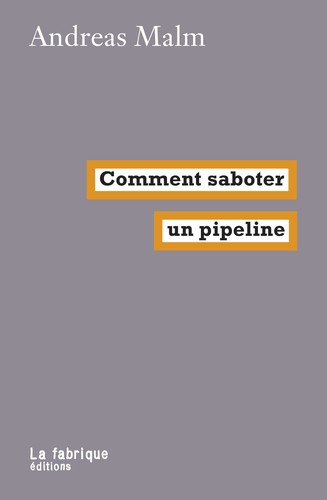colin reviewed How to Blow up a Pipeline by Andreas Malm
frustrating
2 stars
There's a bunch of other criticism of this book and I don't think I can do any better, but a few notes:
1) This book is way too writerly and the author is way too in love with their flourishes of speech. I almost noped out several times because the author wrote pages and pages of totally frustrating bullshit just to counter it later. 2) The author's clear struggles with the notion that violence might be able to accomplish a goal are understandable but exhausting. I'm honestly not sure that they agree with the premise of their own book. There's so much moralizing and prevaricating about it that I'm not convinced they do. 3) There's an undertone of casual racism throughout the book. I was pretty creeped out by the description of activists sneaking through a dark neighborhood while they deflated tires as a bunch of Indian warriors, There's also …
There's a bunch of other criticism of this book and I don't think I can do any better, but a few notes:
1) This book is way too writerly and the author is way too in love with their flourishes of speech. I almost noped out several times because the author wrote pages and pages of totally frustrating bullshit just to counter it later. 2) The author's clear struggles with the notion that violence might be able to accomplish a goal are understandable but exhausting. I'm honestly not sure that they agree with the premise of their own book. There's so much moralizing and prevaricating about it that I'm not convinced they do. 3) There's an undertone of casual racism throughout the book. I was pretty creeped out by the description of activists sneaking through a dark neighborhood while they deflated tires as a bunch of Indian warriors, There's also a lot of casual comparisons between environmental activists and enslaved people that I don't think hold up to criticism, and there's plenty of Islamophobia scattered throughout the book, especially regarding the notion that terrorism should be a a total non-starter for the environmental movement. 4) This book is basically two really long chapters about how great XR is and how some mild property destruction might help save the planet, and then a third one that purports to offer a little bit of hope at the end of a pretty depressing book but is mostly a chance to slag on a couple of the edgier environmental movements of the last few decades. Malm (rightfully) attacks a few movements that advocated for the need to drop the human population of the globe, but gloms in some movements that didn't advocate for that sort of thing too, and what's worse, a quick web search for "extinction rebellion population control" or something like that will reveal a bunch of XR chapters advocating for the same exact things. 5) A bunch of the actions in the book end with the police showing up and maybe swinging some batons around. I don't think the author has really considered what would happen in the US or China if activists started employing these tactics -- a bunch of people are going to get shot by the police state and their supporters, and they're going to get away with it. It makes the book seem fundamentally unserious.
Anyway, the author could probably get more done by posting a list of all of joe manchin's known addresses and advice on decent sights for a long gun, but I don't think he's ready to admit that.


